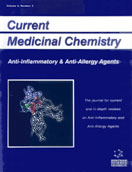Abstract
The natural polyamines, named 1,4-diaminobutane, N-aminopropyl-1,4-diaminobutane and N,N-bisaminopropyl- 1,4-diaminobutane, are also designated respectively as putrescine, spermidine and spermine. They are polycationic compounds found in all eukaryotic cells. As they are deeply involved in cell functions, e.g. cellular growth, their concentration and their equilibrium in the intracellular pool are maintained in very narrow limits by regulatory mechanisms acting in a very fast, sensitive and precise way. These compounds are involved in gut inflammatory processes and in allergy. Indeed, they control the production of inflammatory mediators in several cell lines or tissues. Polyamine metabolism could be considered as a putative target for inflammation, allergy prevention or therapy.
Keywords: polyamines, gI tract, inflammation, allergy, probiotic
 15
15

